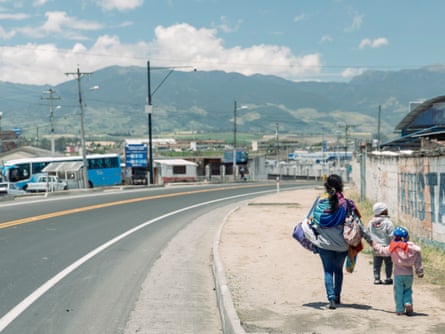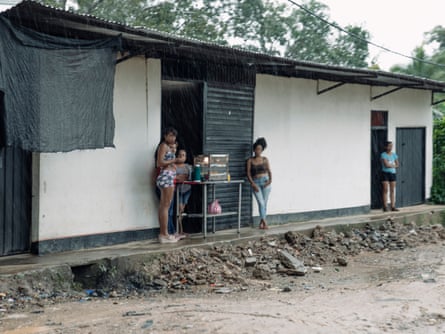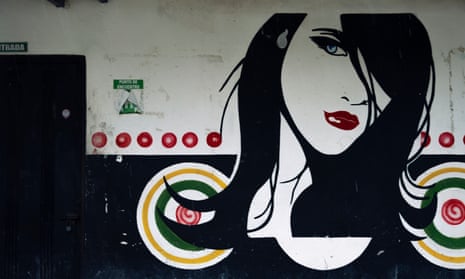The family had nothing at home, says mother of six Luisa Hernández, 30, from Zulia state, Venezuela. “To see your children grow up without food, without anything, is unbearable.
“Eating from rubbish bins to survive was no life, so we left. But, now with the pandemic, we are in limbo, we are stuck in Colombia, and hungry again. We have gone from one crisis to another.”
Venezuela’s total economic collapse has fuelled a large-scale, complex and underfunded humanitarian crisis. An estimated 4.5 million Venezuelans have fled a country blighted by unemployment, collapsing utilities, a defunct healthcare system and severe food shortages.
And as refugees, it is women who have been the most vulnerable to labour and sexual exploitation, trafficking and violence.
The backbone working class marched out of Venezuela largely on foot, their worldly possessions stuffed into black bin liners or rolled behind them in suitcases, travelling along arterial roads and highways to cross the borders – legally and illegally – into countries now shouldering the crisis.
Coronavirus exacerbated the problem of illegal entry and forced los caminantes (the walkers) to take to informal trail roads, or trochas, as lockdowns across South America closed borders.
“I have heard many stories about women on these trails,” says Paola Vargas, 36, a mother of three stuck in Cúcuta on Colombia’s northern border. “Smugglers, traffickers and irregular armed groups charge around $2.50 (£1.95) so you can cross the border. It’s not a legal crossing nor is it safe. There are no guarantees you’ll make it out of there, especially if you are a woman,” she said.
“Men think that because you are on your own with children, women must be selling themselves. I have had several propositions to sell myself in order to feed my children. It is really difficult to refuse because I need the work” Vargas adds.
During lockdown, Venezuelans, who constitute more than 50% of Colombia’s informal labour force, have been forced indoors, with no source of income to pay for food and rent.
Alexandra Moncada, country director for Care International in Ecuador, says: “There are as many as 400 evictions a day in Ecuador alone under the pandemic, due to the inability to pay rent, forcing entire families to sleep on the street, including pregnant women and children. Life conditions have turned from bad to worse, especially for hundreds of adolescent girls from impoverished and migrant households.”

Little has been done by the international community or national governments to address gender-specific issues.
“Venezuelan refugees from Bogotá to Lima forced into sex work to survive have no option but to continue working during the coronavirus pandemic,” says Karina Bravo, a former sex worker now helping to protect the rights of working girls in Ecuador through the Latin American Network of Sex Workers (Plaperts).
Ecuador brought in mandatory quarantine in April, but by May Venezuelan girls were forced out of brothels and on to street corners in Machala, near the Peruvian border, in search of clients.
Bravo says: “The conditions for sex workers now under the pandemic is worrying. Quarantine measures have meant they are unable to generate enough income for their families back in Venezuela, or even to sustain themselves.”
Two years ago, in a coffee shop in Machala, at the height of the refugee crisis, Bravo told me that due to the number of Venezuelan women desperate to earn money to send home, many were offering sex for $9, half that charged by their Colombian counterparts.
Now Bravo says: “I know many Venezuelans servicing clients in southern Ecuador for as little as $2 under the pandemic in order to survive.”
Medical services available to sex workers before lockdown have dried up. Health centres have all but stopped giving out condoms and health checks. “On top of the lack of medical care, they are experiencing food shortages, emotional stress and increased rates of gender-based violence including stabbings and rape as local law enforcement officials are preoccupied enforcing lockdown and quarantines. Things are desperate here, we need more help,” Bravo says.
With little help available from humanitarian agencies, refugees left destitute at borders with Peru, Ecuador and Colombia are faced with the decision of either waiting the pandemic out or heading home.
An estimated 70,000 refugees have returned to Venezuela, crossing at Cúcuta where they were reported to be eating dogs, cats and pigeons to survive.
“Families here are selling their daughters into sex work as young as 12 years old and for as little as a dollar right now in Cúcuta,” says Jana López, 60, a volunteer helping migrant families in the area.
“Men are preying on vulnerable families during the pandemic, small girls have been drugged and raped. We are also seeing an increase in irregular armed groups forcibly recruiting both boys and girls as young as 10 for the purposes of trafficking.
“Migrant families here are faced with impossible choices and sex work has become the only source of income for many during the pandemic,” adds López, herself a survivor of a brutal attack by seven men.

Care Ecuador’s Moncada says: “There is a general lack of resources and mechanisms in place to provide shelter, food and protection to women and adolescent girls (some so young as 12 to 14) and even their children. The world needs to acknowledge these horrible situations, and to act, to improve the levels of humanitarian response.”
Over the past four years, on a per capita basis, Venezuelan refugees have received just $125 compared with Syrian refugees in crisis getting $1,500.
Meanwhile, traffickers, brothel proprietors, hotel concierges, contraband smugglers and taxi drivers all take their cut from the exploitation of women and young girls. Without urgent international intervention this is set to continue as the number of Venezuelan refugees is predicted to exceed 6 million by the end of the year.
This article was amended on 13 August 2020. Information provided by the Venezuelan government after publication showed that 70,000 people have crossed the border at Cúcuta, rather than being stranded there as an earlier version said.
